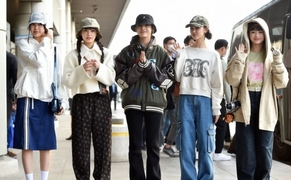 |
| The departure hall at Incheon International Airport on Dec. 14, 2021. / Source: Yonhap |
AsiaToday reporter Lee Sun-young
It has been confirmed that four people, who received COVID-19 booster shots, have tested positive for the Omicron variant.
The Korea Disease Control and Prevention Agency (KDCA) reported Sunday that four people were infected with the Omicron variant despite having received booster shots. This is the first time in the country where people administered with booster shots have been infected with the Omicron variant.
Among the four infections, two had received booster shots after receiving the Janssen vaccine while other two had received Pfizer booster shots after receiving Pfizer and AstraZeneca vaccines, respectively. One of them tested positive three days after vaccination, and the other three were confirmed 14 days after inoculation.
Booster shots can help protect you from the Omicron variant, however many points out that a third shot does not provide 100% protection against the variant. In fact, preliminary findings by researchers in the United Kingdom showed that a booster shot provides around 71 to 76 percent protection against the Omicron variant, compared to around 93 to 94 percent for the Delta variant.
The country reported 12 more Omicron cases for Saturday, pushing the total caseload to 178. All of the 12 new infections were detected in inbound travelers. Six cases were reported among people entering Korea from the United States, four from the UK, along with one each from Ghana and Tanzania.
Among the total 178 omicron cases, 88 were not vaccinated. Four people received only the first dose, while 78 people were fully vaccinated with two doses. The vaccination records of the remaining six people were not available.
By the route of infection, 124 cases were local infections while 54 from overseas. While 98 of the total cases are female patients, 80 patients are male. Ninety-four patients are Korean nationals while 84 are foreigners.
By age groups, those between 20-39 years of age had the most patients with 81, followed by those under 20 with 47, and those between 40-59 years of age with 37 patients. Those between 60-74 years of age had 10 patients while those aged over 75 had 3 patients.
Since the Omicron variant was first detected in Korea on Dec. 1, the variant has been spreading in the local community. Excluding 29 cases confirmed during the quarantine process, the variant was found in eight cities and provinces. Incheon had the most with 62 cases, followed by North Jeolla Province with 30, while Seoul and South Jeolla Province had 23 and 22 cases, respectively. Gyeonggi Province had 7 confirmed cases, and South Gyeongsang Province had 3 cases. North Chungcheong Province and Sejong had one each.
At least 74 Omicron cases reported in Korea were related to a church in Incheon’s Michuhol district, including the first Omicron cases detected in the country involving a pastor couple who tested positive upon their arrival from Nigeria.
#omicron #COVID-19 #booster shot
Copyright by Asiatoday
Most Read
-
1
-
2
-
3
-
4
-
5
-
6
-
7





















